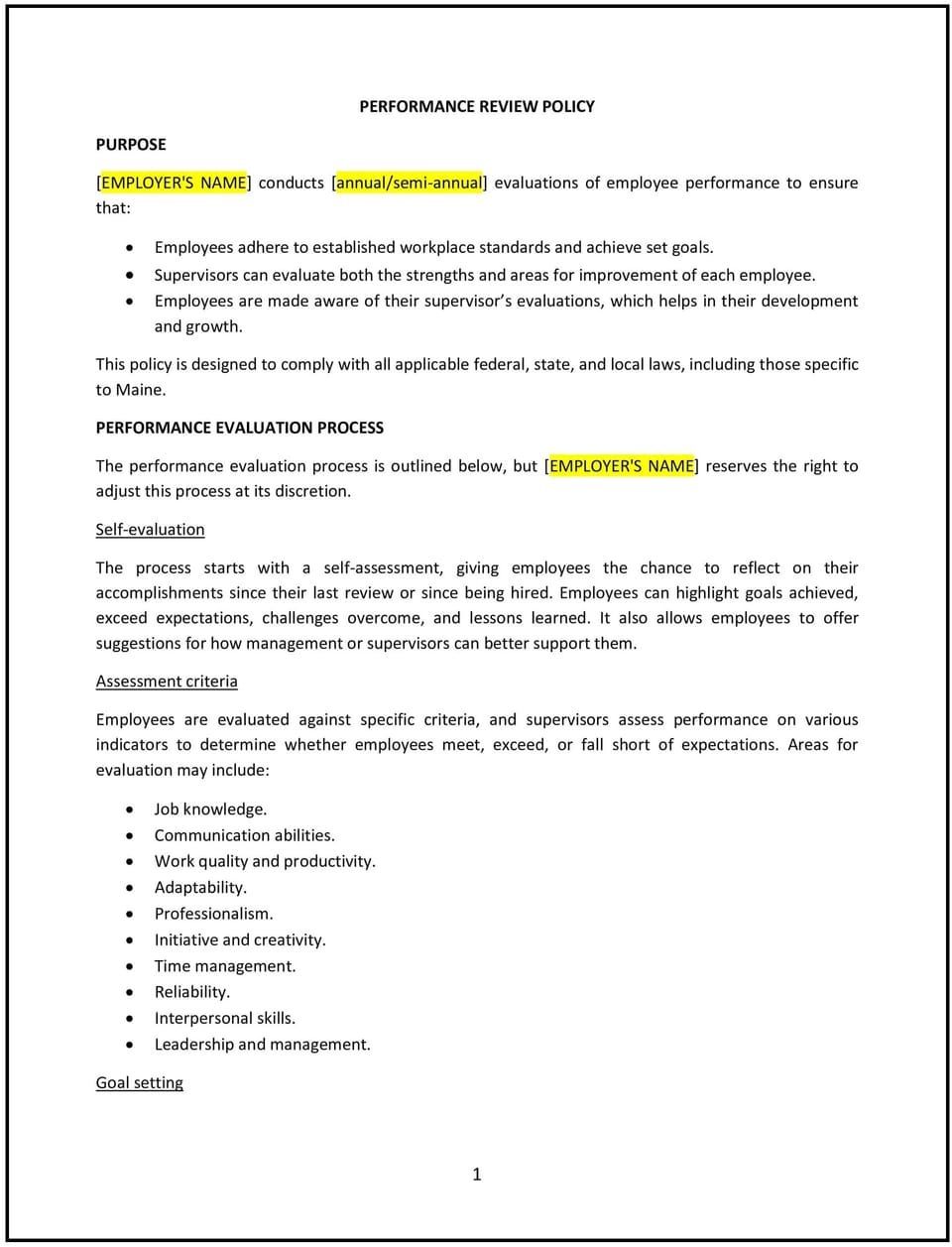Performance review policy (Maine): Free template

Performance review policy (Maine): Free template
This performance review policy is designed to help Maine businesses establish a clear, consistent, and fair approach to evaluating employee performance. It outlines the frequency, process, and criteria for performance reviews, ensuring that employees receive regular feedback and opportunities for growth, while aligning with the company’s goals and values.
By implementing this policy, Maine businesses can foster a culture of continuous improvement, enhance employee engagement, and support professional development.
How to use this performance review policy (Maine)
- Define the purpose of performance reviews: Explain that the goal of performance reviews is to assess employees' job performance, identify strengths and areas for improvement, and provide constructive feedback to enhance their development.
- Set review frequency: Specify how often performance reviews will occur (e.g., annually, semi-annually, or quarterly) and whether they will include both self-assessments and manager assessments.
- Outline performance criteria: Detail the specific metrics and factors that will be assessed, such as productivity, quality of work, communication skills, teamwork, problem-solving abilities, and alignment with company values.
- Provide feedback guidelines: Clarify how managers should deliver feedback, ensuring it is constructive, specific, and aimed at helping employees improve.
- Set goal-setting procedures: Include a process for setting performance goals during the review, with clear action plans and timelines for achieving them.
- Address performance issues: Outline procedures for handling underperformance, including the creation of performance improvement plans (PIPs) and timelines for addressing concerns.
- Review regularly: Update the policy to reflect changes in business practices, industry standards, or employee feedback.
Benefits of using this performance review policy (Maine)
Implementing this policy provides several benefits for Maine businesses:
- Promotes professional development: Provides employees with clear expectations and actionable feedback to improve their skills and advance in their careers.
- Enhances communication: Fosters open communication between employees and managers, ensuring that employees understand how they are performing and what is expected of them.
- Increases motivation: Regular performance reviews help employees feel valued and engaged, leading to higher motivation and job satisfaction.
- Improves accountability: Establishes clear performance metrics and goals, making it easier for employees to track progress and stay aligned with company objectives.
- Ensures fairness: Ensures that all employees are evaluated based on consistent criteria, reducing bias and promoting fairness in the review process.
Tips for using this performance review policy (Maine)
- Train managers: Provide training for managers on how to conduct effective performance reviews, deliver constructive feedback, and set clear goals.
- Be consistent: Apply the performance review process consistently across all departments to ensure fairness and transparency.
- Set clear expectations: Clearly communicate performance expectations and review criteria to employees, so they understand what is being evaluated.
- Document reviews: Keep thorough documentation of each performance review, including feedback provided, goals set, and any follow-up actions.
- Monitor progress: Follow up regularly on performance goals and provide ongoing support to employees to help them meet expectations.
- Stay flexible: Allow for adjustments to the review process based on individual needs or team feedback to continuously improve the performance review system.
Q: How often should performance reviews be conducted?
A: Performance reviews should be conducted regularly, whether annually, semi-annually, or quarterly, depending on the business’s needs and practices.
Q: What criteria are used to assess employee performance?
A: Employee performance may be assessed based on factors such as productivity, quality of work, communication, teamwork, problem-solving, and alignment with company values.
Q: How should managers deliver feedback during performance reviews?
A: Feedback should be constructive, specific, and aimed at helping employees improve. Managers should focus on both strengths and areas for improvement, providing clear examples.
Q: What happens if an employee’s performance is below expectations?
A: If an employee’s performance is underperforming, the policy should outline a performance improvement plan (PIP), which includes clear goals, timelines, and support to help the employee improve.
Q: Are performance reviews linked to salary increases or promotions?
A: Performance reviews may be used to inform decisions regarding salary increases, bonuses, or promotions, but they should also be focused on employee development and growth.
Q: How can businesses ensure that performance reviews are fair?
A: Businesses should apply consistent criteria across all employees, provide training for managers, and encourage transparency throughout the review process.
Q: Can employees request feedback outside of formal performance reviews?
A: Yes, employees should be encouraged to seek feedback from their managers at any time, fostering a culture of continuous improvement and communication.
This article contains general legal information and does not contain legal advice. Cobrief is not a law firm or a substitute for an attorney or law firm. The law is complex and changes often. For legal advice, please ask a lawyer.


